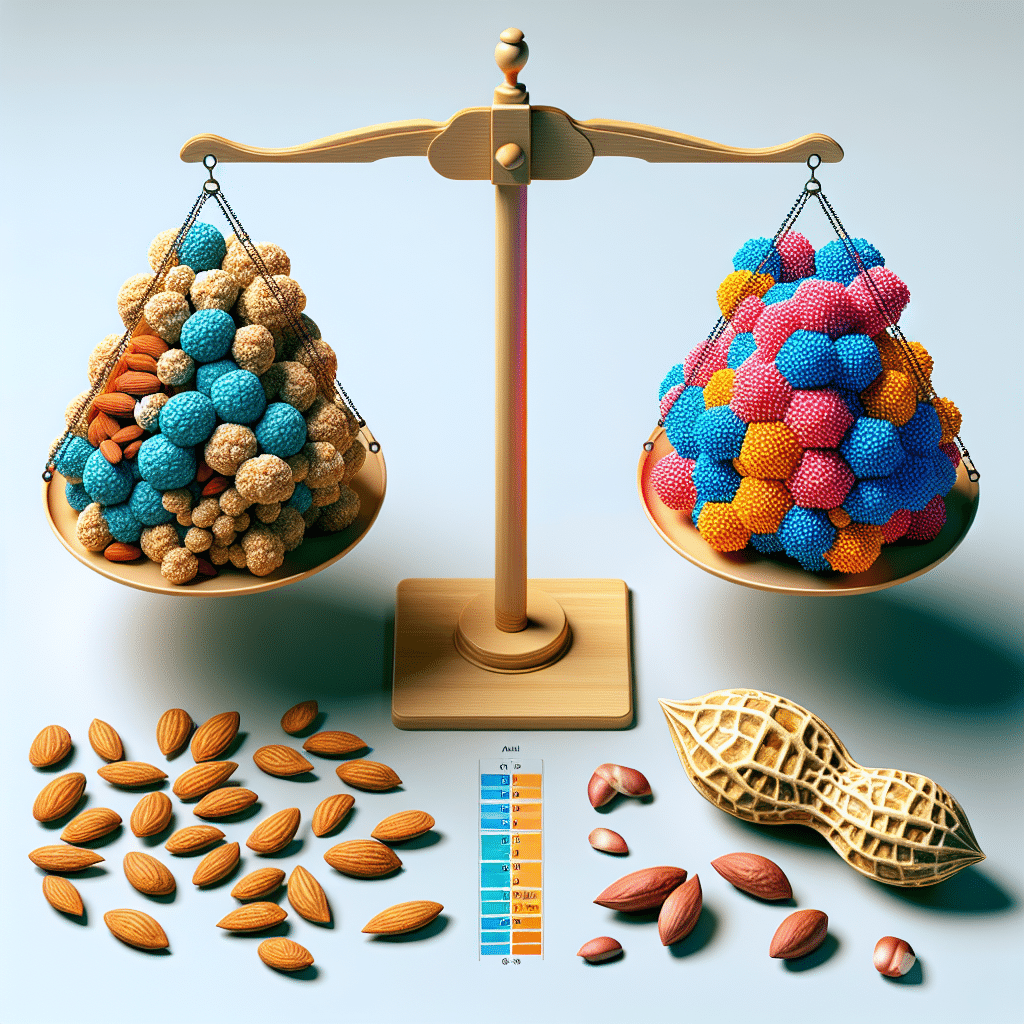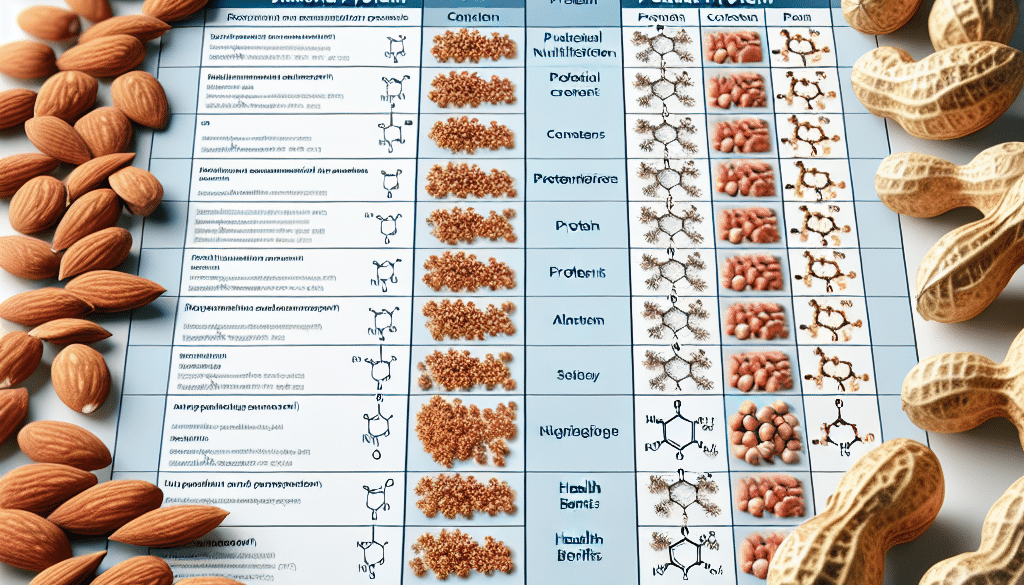Is Almond Or Peanut Protein Better? Discover More
Table of Contents
Almond vs. Peanut Protein: Which Is the Superior Choice?

When it comes to plant-based proteins, almonds and peanuts are two popular sources that many health-conscious individuals incorporate into their diets. Both nuts are not only rich in protein but also offer a variety of other nutrients that can contribute to a balanced diet. However, the question remains: Is almond or peanut protein better? This article delves into the nutritional profiles, health benefits, and potential drawbacks of almond and peanut proteins to help you make an informed decision.
Nutritional Comparison of Almond and Peanut Protein
Before we can determine which nut protein is superior, it’s essential to compare their nutritional content. Here’s a breakdown of what each offers:
- Almond Protein: Almonds are a good source of protein, with approximately 21 grams of protein per 100 grams. They are also rich in vitamin E, magnesium, and healthy monounsaturated fats. Additionally, almonds contain fiber, which can aid in digestion and promote a feeling of fullness.
- Peanut Protein: Peanuts contain slightly more protein, with about 25 grams per 100 grams. They are an excellent source of biotin, niacin, and folate. Peanuts also provide healthy fats, primarily monounsaturated and polyunsaturated fats, and are a good source of antioxidants.
Both almonds and peanuts contain essential amino acids, although they do not individually offer a complete protein profile. However, when combined with other protein sources, they can contribute to a well-rounded amino acid intake.
Health Benefits of Almond and Peanut Protein
Almond and peanut proteins offer several health benefits that go beyond their protein content:
- Heart Health: The monounsaturated fats in both almonds and peanuts are known to support heart health by reducing bad cholesterol levels and potentially lowering the risk of heart disease.
- Weight Management: The protein and fiber in almonds and peanuts can help regulate appetite and prevent overeating, making them beneficial for weight management.
- Diabetes Control: Both nuts have a low glycemic index, which means they have a minimal impact on blood sugar levels, making them suitable for individuals with diabetes.
- Antioxidant Properties: Almonds are high in vitamin E, an antioxidant that helps protect cells from oxidative damage. Peanuts contain resveratrol, another antioxidant linked to reduced risk of chronic diseases.
Potential Drawbacks
While both almond and peanut proteins have their advantages, there are also potential drawbacks to consider:
- Allergies: Peanut allergies are one of the most common food allergies and can be life-threatening. Almond allergies are less common but still pose a risk for some individuals.
- Aflatoxins: Peanuts are susceptible to contamination by aflatoxins, which are toxic compounds produced by certain molds. Aflatoxins can pose health risks if consumed in large quantities over time.
- Environmental Impact: Almond farming, particularly in California, has been criticized for its high water usage. Sustainable farming practices are essential to mitigate environmental concerns.
Choosing Between Almond and Peanut Protein
When deciding between almond and peanut protein, consider the following factors:
- Dietary Restrictions: If you have a peanut allergy, almond protein is the clear choice. Conversely, if you’re allergic to almonds, opt for peanut protein.
- Nutritional Goals: If you’re looking for higher protein content and more antioxidants like resveratrol, peanuts might be preferable. For higher fiber and vitamin E content, almonds could be the better option.
- Environmental Concerns: If water usage and sustainability are significant concerns for you, you may want to research the sourcing of your almonds or consider other protein sources.
Ultimately, both almond and peanut proteins can be part of a healthy diet. The choice between them may come down to personal preference, nutritional needs, and ethical considerations.
Conclusion: Almond or Peanut Protein?
In conclusion, both almond and peanut proteins offer unique benefits and can be excellent additions to a balanced diet. Almonds provide a good source of vitamin E and fiber, while peanuts offer more protein and antioxidants. The decision between the two should be based on individual dietary needs, potential allergies, and environmental considerations. Incorporating a variety of protein sources, including both almonds and peanuts, can ensure a comprehensive intake of nutrients and amino acids.
Discover ETprotein’s Premium Protein Products
If you’re looking to enhance your diet with high-quality plant-based proteins, consider ETprotein’s range of products. They offer organic and non-GMO protein options, including peanut protein, that cater to various dietary preferences and nutritional requirements. With a commitment to purity and quality, ETprotein is an excellent choice for your protein needs.
About ETprotein:
ETprotein, a reputable protein and L-(+)-Ergothioneine (EGT) Chinese factory manufacturer and supplier, is renowned for producing, stocking, exporting, and delivering the highest quality organic bulk vegan proteins and L-(+)-Ergothioneine. They include Organic rice protein, clear rice protein, pea protein, clear pea protein, watermelon seed protein, pumpkin seed protein, sunflower seed protein, mung bean protein, peanut protein, and L-(+)-Ergothioneine EGT Pharmaceutical grade, L-(+)-Ergothioneine EGT food grade, L-(+)-Ergothioneine EGT cosmetic grade, L-(+)-Ergothioneine EGT reference grade and L-(+)-Ergothioneine EGT standard. Their offerings, characterized by a neutral taste, non-GMO, allergen-free attributes, with L-(+)-Ergothioneine purity over 98%, 99%, cater to a diverse range of industries. They serve nutraceutical, pharmaceutical, cosmeceutical, veterinary, as well as food and beverage finished product distributors, traders, and manufacturers across Europe, USA, Canada, Australia, Thailand, Japan, Korea, Brazil, and Chile, among others.
ETprotein specialization includes exporting and delivering tailor-made protein powder and finished nutritional supplements. Their extensive product range covers sectors like Food and Beverage, Sports Nutrition, Weight Management, Dietary Supplements, Health and Wellness Products, and Infant Formula, ensuring comprehensive solutions to meet all your protein needs.
As a trusted company by leading global food and beverage brands and Fortune 500 companies, ETprotein reinforces China’s reputation in the global arena. For more information or to sample their products, please contact them and email sales(at)ETprotein.com today.












